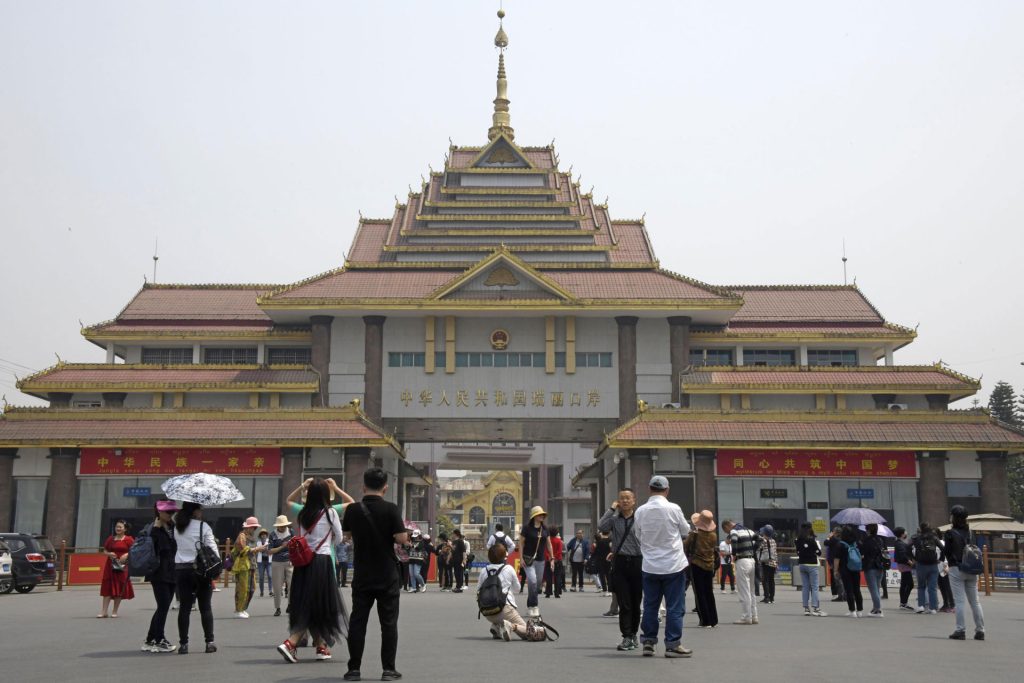ISP Explainer No. 02
(This article is a translation of the original Burmese language version that ISP-Myanmar posted on its Facebook page on May 24, 2023.)
This discussion focuses on the development of China-Myanmar relations over a two-month period, from March to May 2023, based on the ISP Timeline on China-Myanmar relations. Recently, China has been actively advocating for a fresh reset via its ‘Neighborhood Diplomacy’ approach to Myanmar. Meanwhile, China is pursuing development of an International Land-Sea Trade Corridor (ILSTC). Chinese local authorities are promoting plans for economic cooperation with Myanmar in order to implement the scheme. At the same time, China is also urging Myanmar to collaborate in China-Thailand-Myanmar trilateral operations combating transnational crime in border regions that connect the three countries.
∎ Summary of issues around the bilateral relationship
An analysis of ISP-Myanmar’s timelines on China-Myanmar relations from March 17 to May 17, reveals a total of seventy significant issues documented (See Table No. 1), with the dominant subjects being political economy, diplomacy, geopolitics, as well as social and human rights. In this ISP Explainer No. 2, ISP-Myanmar will provide a concise overview of these five pivotal issues.
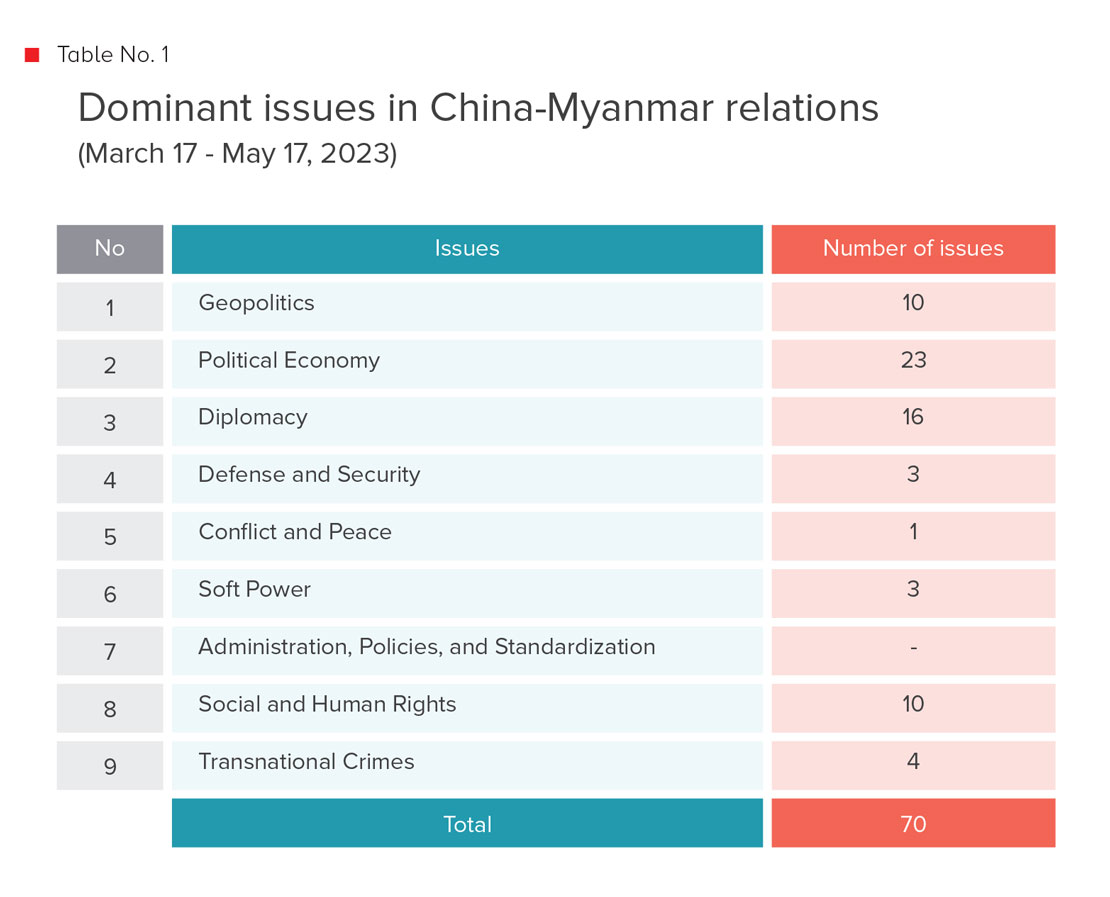

1. Anti-China Protests following Foreign Minister Qin Gang’s visit to Myanmar
Following the visit of China’s Foreign Minister Qin Gang to Myanmar, a noteworthy development has been the emergence of anti-China protests in several areas of the country. These movements have gained traction particularly in areas where Chinese copper mine projects are located, such as Salingyi, Yinmabin, and Monywa townships in Sagaing Region, as well as Yangon Region. These protests are led by local activist groups and mark a significant resurgence of anti-Chinese sentiment, reminiscent of the anti-China protests that erupted immediately following the military coup in 2021. Notably, the local defense force from Myaing Township in Magwe Region has joined the protest movement, with some influential individuals, as well as the general public, widely expressing negative views about China on social media platforms. Adding to the tense situation, just five days after Mr. Qin Gang’s visit, a local defense force reportedly launched a shelling attack on a gas pipeline control unit in Natogyi Township in Mandalay Region.
In response to the visit, National Unity Government (NUG) spokesperson U Kyaw Zaw said on May 3 that the NUG acknowledged the initiative of China in stabilizing the situation in Myanmar, but urged China to engage in greater dialogue with ethnic armed groups and the NUG, in line with the will of the people of Myanmar. Moreover, the General Strike Coordinating Committee (GSCC) in an open letter dated May 13, urged the Central Committee of the Chinese Communist Party to respect the true aspirations of the people of Myanmar who have struggled through the ‘Spring Revolution’ and to build a ‘Paukphaw’ relationship with the legitimately elected government of Myanmar. Despite growing anti-China sentiment following Mr. Qin Gang’s visit, the China International Development Cooperation Agency (CIDCA) stated that it would provide emergency assistance to victims of Cyclone Mocha, which hit Myanmar on May 14. Power Construction Corporation of China, the developer of Kyaukphyu Power Project, assisted cyclone survivors with finance and food.
2. Three Chinese provinces take assertive steps to develop trade corridors and economic plans
China is pursuing the new International Land-Sea Trade Corridor (ILSTC), a major international logistics project, which passes through Myanmar. To facilitate this initiative, Chinese local authorities are taking steps to implement cross-border routes in Kachin and Shan States, as well as to improve overall infrastructure in the region. Chinese authorities intend to link the rail line between Chinshwehaw of Kokang Self-administrative Zone to Lancang prefecture of Yunnan province. China is also focused on developing the cross-border Free Trade Zone and upgrading infrastructure and border area management. As part of this project, Mr. Du Juanhui, Mayor of Lancang City, spoke with U Chan Aye, permanent secretary of the SAC Ministry of Foreign Affairs in Naypyitaw on March 21. To facilitate trade along the new China-Myanmar-Indian Maritime Trade Route, a new MoU for cross-border trade is necessary in order to establish mechanisms to manage the high trade volumes expected. In order to initiate the project, Chinese officials recently met with the Director General of the SAC’s Ministry of Commerce and are expecting overseas Chinese in Myanmar to invest in Lancang.
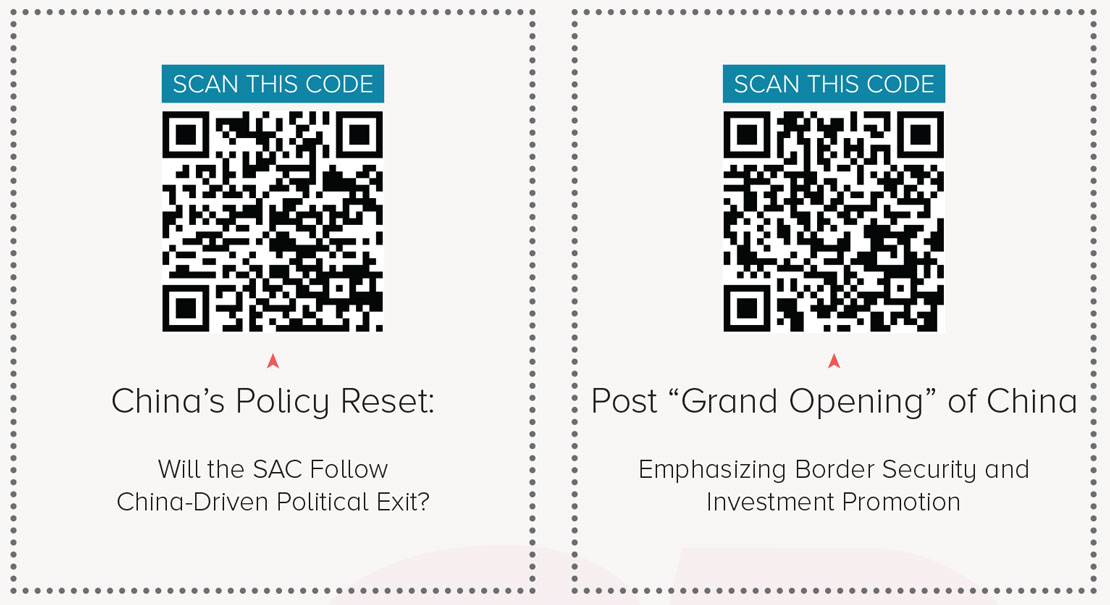
To speed up development of the new ILSTC China is improving economic cooperation between Myanmar and China’s eight western provinces, autonomous regions, and municipalities. The new initiative is a multi-sectoral cooperation project, including trade, mining, the IT sector, investment, and electric cars. To this end, an economic delegation from Guangxi Zhuang Autonomous Region, led by a deputy director of the Foreign Affairs Office held a meeting with Myanmar’s Consul General in Nanning on March 16. Similarly, Mr. Ding Yuanlong, Deputy Secretary General of the China-ASEAN Business and Investment Summit Secretariat met with Myanmar’s Consul General in Nanning on May 8. The parties discussed the promotion of trade in agricultural and fishery products between Guangxi Zhuang Autonomous Region and Myanmar, the building of the China- Myanmar Innovation Demonstration Park, and cooperation in the 20th China-ASEAN EXPO (CAEXPO). A new maritime trade link from Guangxi Zhuang Autonomous Region’s Beibu Gulf Port to Myanmar, one route under the ILSTC, was launched last year (See ISP Mapping No. 10: Three New China-Myanmar Cross-border Trade Routes). In addition, Chongqing provincial authorities held talks with the Union of Myanmar Federation of Chambers of Commerce and Industry (UMFCCI) on March 22, to discuss establishing direct flights between the cities of Yangon and Chongqing, investment in new energy vehicles (NEVs), cooperation in the production of agricultural machinery and in the health sector. Both the CCP Party Secretary and Mayor of Leshan city held discussions with Consul General U Zaw Lin Oo on possible cooperation in the economic, education, cultural, and tourism sectors in Myanmar.
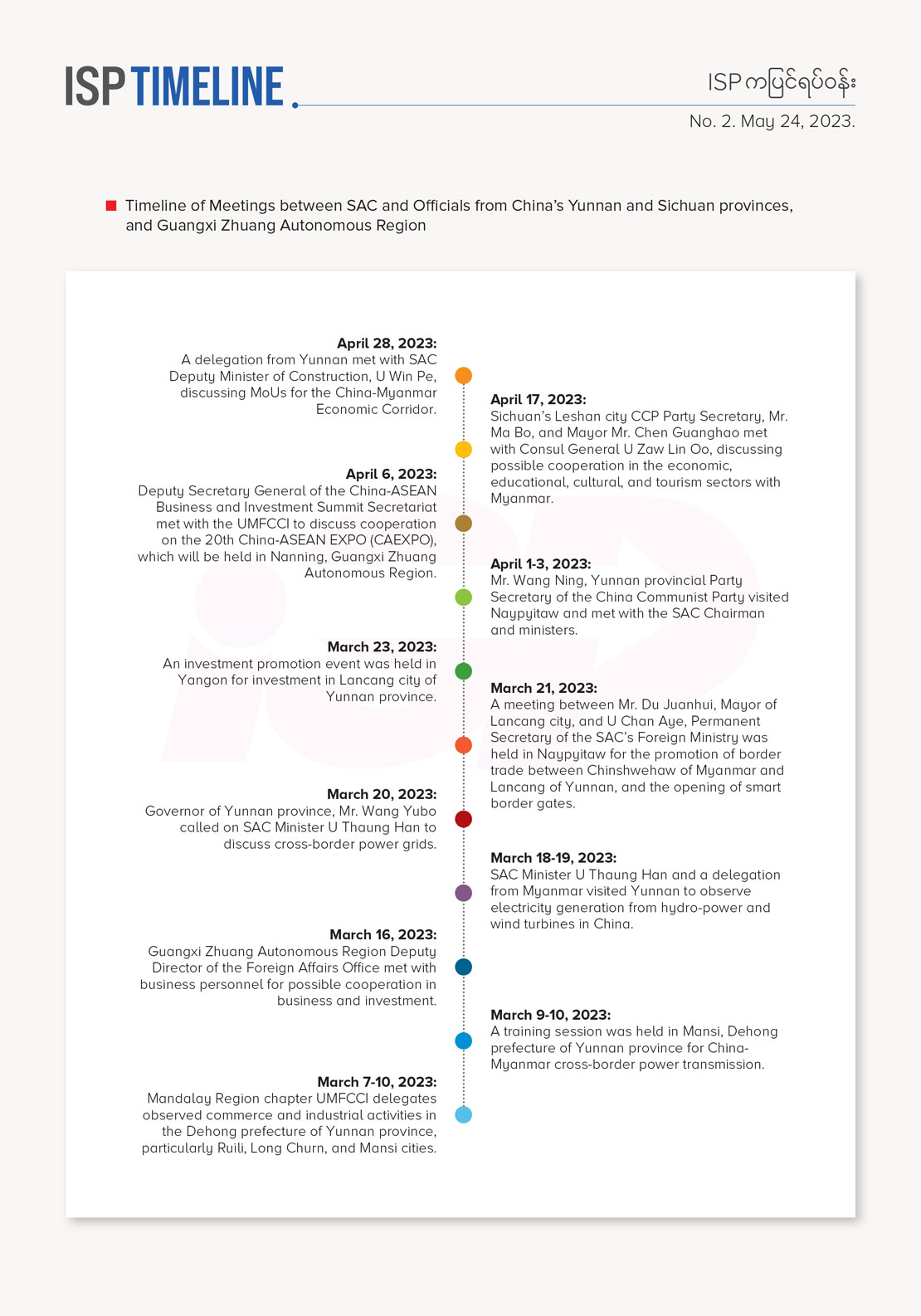
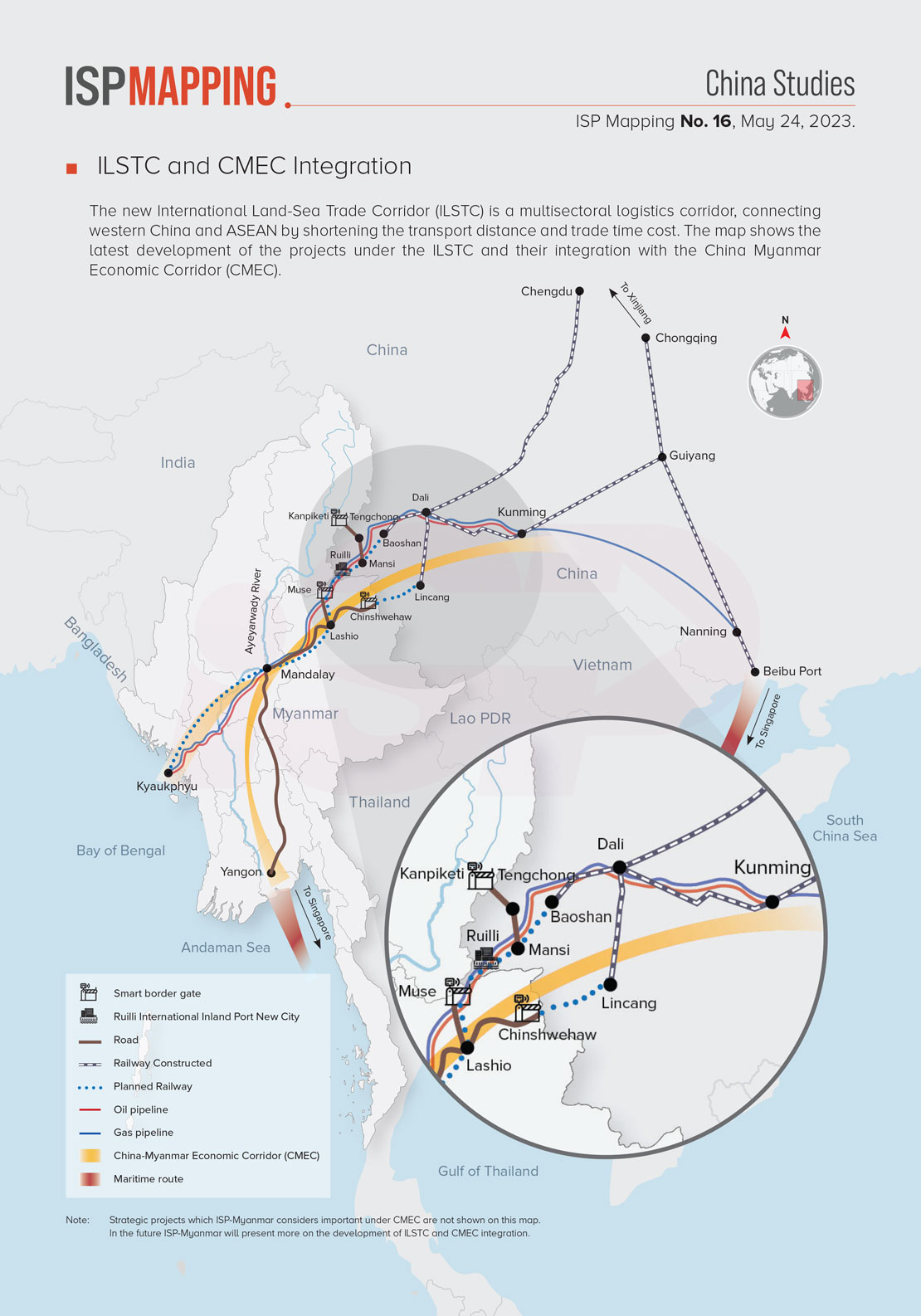
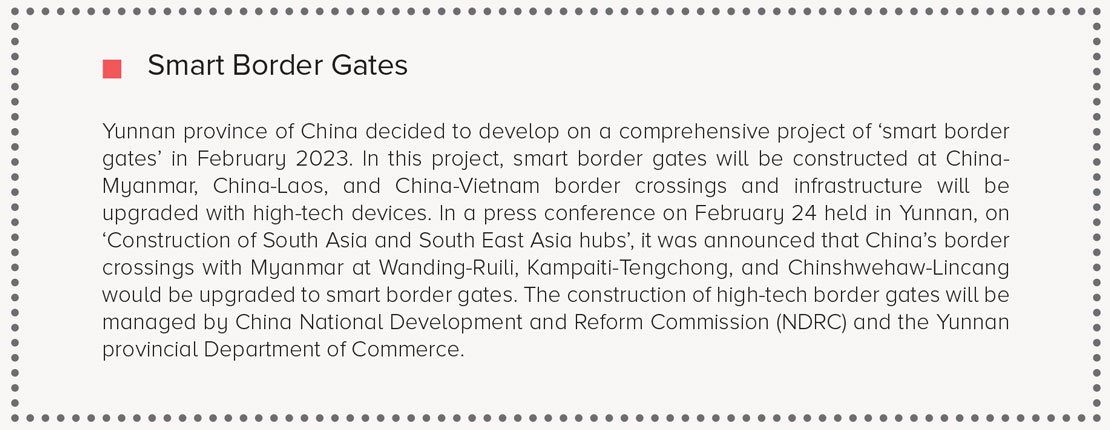
3. China’s new approach to Myanmar affairs
One month following the establishment of the formation of the new Chinese State Council, led by Premier Li Qiang, Mr. Qin Gang, Chinese Foreign Minister and State Councillor visited Myanmar. During this trip to Myanmar, he met with SAC leaders, as well as the former head of the junta and former president. Prior to his visit, Mr. Peng Xiubin, a senior Chinese Communist Party official had made an unpublicized visit to Myanmar, which was then followed by Mr. Qin Gang’s official visit. This marked the first opportunity for Myanmar coup leader, senior Gen. Min Aung Hlaing to officially meet a senior Chinese government official. At the meeting with Myanmar junta leaders, including Minister of Foreign Affairs, U Than Swe, and Minister of International Cooperation, U Ko Ko Hlaing, Mr. Qin Gang emphasized China’s friendly policy towards Myanmar. He reiterated China’s support for Myanmar in international fora, expressed willingness to engage in negotiations to resolve Myanmar’s crisis, emphasized the importance of maintaining political stability on border areas, highlighted the focus on the construction of the China-Myanmar Economic Corridor (CMEC), and China’s support in solving the issue of Rohingya returnees.
During his meeting with former leaders U Than Shwe and U Thein Sein, Mr. Qin Gang primarily focused on strengthening the profound friendship between the two countries built over generations, firmly supporting Myanmar’s sovereignty and territorial integrity, and maintaining internal peace and achieving sustainable development suited to Myanmar’s national conditions.

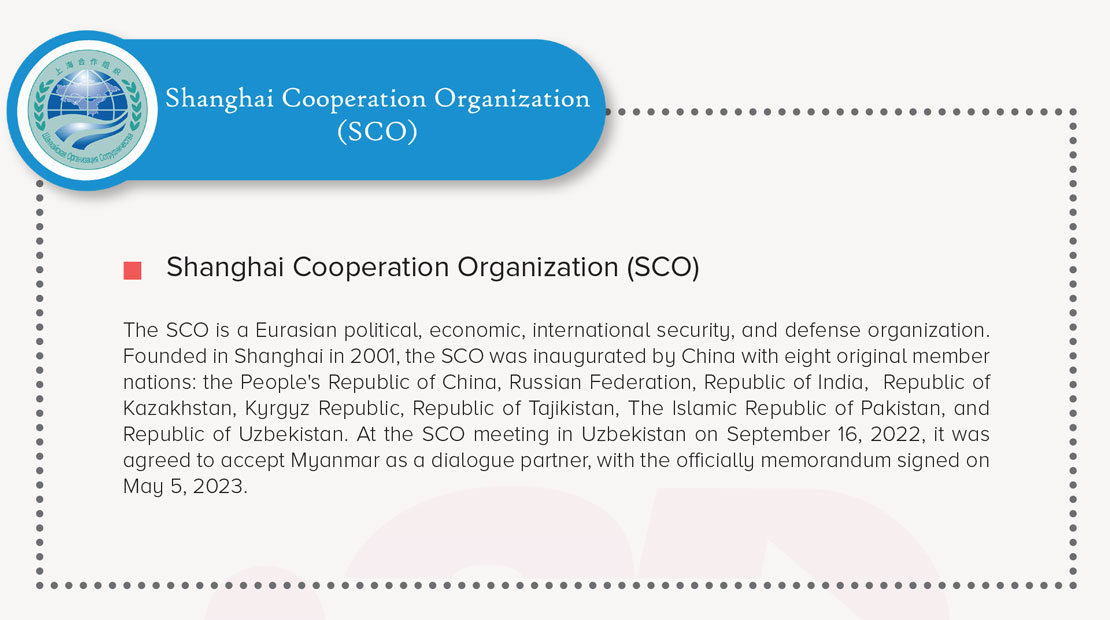
China’s recent endeavors to address Myanmar’s political and peace processes can be perceived as a novel approach to their ‘Neighborhood Diplomacy’ policy. This approach involves meticulous effort and significant intervention, providing the State Administration Council (SAC) with what can be considered ‘a second chance’ (See ISP OnPoint No. 14 on China’s Policy Reset: Will the SAC Follows China-driven Political Exit?).
The timing of the amnesty on May 3 where the SAC granted freedom to 2,153 political prisoners was notable, as it occurred just one day after Chinese Foreign Minister Mr. Qin Gang’s visit to Naypyitaw, where he met with Myanmar’s SAC leaders. This amnesty led to the second-largest number of political prisoners released in over twelve rounds of pardons (See Data Matters No. 44). Prior to his Naypyitaw visit, Mr. Qin Gang visited Ruili, a Chinese city bordering Myanmar, met with locals, and reiterated that China wished to implement the CMEC project under the BRI in partnership with Myanmar. The SAC stated that Mr. Qin Gang’s visit was a display of China’s support in international diplomacy, while China’s side advocated the international community to respect Myanmar’s sovereignty and territorial integrity. Just after the Chinese Foreign Minister’s visit, the Shanghai Cooperation Organization (SCO) accepted Myanmar as a dialogue partner, and Myanmar’s ambassador to India, U Moe Kyaw Aung, and SCO Secretary General, Mr. Zhang Ming signed an acknowledgment memorandum. Soon after, on May 9, the Indian government inaugurated the Sittwe port in Rakhine State, developed as a part of the Kaladan Multi-Modal Transit Transport Project (KMTTP). Myanmar’s strategic location in the rivalry between China and India for access to the Indian Ocean is once again highlighted, indicating its potential significance after a period of isolation.
4. Chinese Communist Party’s intervention in SAC election plan
Following two significant meetings in China, certain Chinese officials started exploring the possibility of elections proposed by the SAC. In the first week of April, Mr. Wang Ning, a Member of the CCP Central Committee and Secretary of the CCP Yunnan Provincial Committee, visited Naypyitaw and discussed the strengthening of economic cooperation. Mr. Wang Ning met with the SAC Chairman and signed five MoUs with U Ko Ko Hlaing, SAC Minister of International Cooperation. The discussions between Mr. Wang Ning and the SAC Chairman revolved around ensuring stability along the border shared by the two countries, establishing direct flights between Yunnan and Myanmar, and fostering closer cooperation between Yunnan and Myanmar (See ISP Explainer No. 1, China’s new approaches through Yunan).
In the second week of April, following the junta’s air attack on Pazigyi village, Mr. Peng Xiubin, Director General of the International Liaison Department of the CCP arrived in Myanmar for a four-day tour of Yangon and Naypyitaw. During his stay, he held meetings with selected major political parties to discuss political developments. However, the Election Commission did not permit meetings with five ethnic political parties, citing ongoing scrutiny of their party registration processes. Mr. Peng Xiubin’s discussions included inquiries about the future role of Daw Aung San Suu Kyi and the National League for Democracy (NLD), as well as the Chinese Communist Party’s views on the matter. His consultations coincided with developments in the SAC’s elections plans. On March 28, the SAC officially annulled the NLD and a few other opposition parties. U Aung Kyi Nyunt, an NLD leader in exile, stated that Chinese officials had expressed their opinion to him, believing that the dissolution of the NLD should not be considered. He confirmed that regular communication between the two parties has been maintained since the CCP’s centennial anniversary on July 1, 2021, and that the CCP views the NLD as an essential presence in Myanmar’s political landscape. In a separate development, Mr. Chen Hai, the Chinese Ambassador to Myanmar, had a second meeting with Election Commission officials in early March, during which he inquired about the progress of the election process.
5. Tri-national approach to combat transnational crimes
The Chinese government has initiated new collaborative efforts with Myanmar and Thailand in combating transnational crime. In line with this, Chinese Foreign Minister Mr. Qin Gang visited the China-Myanmar border just prior to his first official visit to Naypyitaw. During his visit, he emphasized the importance of serious engagement by local officials in combating cross-border crimes.
During his visit to Naypyitaw, Mr. Qin Gang urged Myanmar authorities to collaborate in combating transnational criminal networks, through the tri-national operations of China, Myanmar, and Thailand, given many crime hubs are based on Myanmar’s border. In addition, China pressed Myanmar authorities to assist in repatriating Chinese nationals trapped in crime rings. In a related effort, on March 20, China’s Ministry of Public Security organized a meeting with law enforcement officials from Thailand and Myanmar to enhance efforts in cracking down on transborder criminal activities. Prior to that, China’s special envoy to ASEAN, Mr. Deng Xijun met with ethnic armed organizations from northern Myanmar, aiming for closer cooperation in combating cross-border crime (See ISP Explainer No. 1 on the management of transborder crimes). It is worth noting that these efforts may be connected to an incident where the Kokang force (MNDAA), an ethnic armed group from Northern Shan State, executed four Chinese criminals who had committed serious crimes.
In addition, since May 6, Myanmar authorities have prohibited foreigners, except for diplomatic and UN officials and staff of INGOs, from boarding flights to border towns, such as Tachileik and Lashio. Moreover, at the recent summit in Labuan Bajo, top ASEAN leaders have pledged to crackdown on human traffickers and online scams.
As the rule of law continues to deteriorate through conflict in the southeast Myanmar-Thai border area, transborder criminal gangs have been increasingly threatening human security in the region. At the same time, the growth of criminal gangs has ramifications for national politics and threatens unity within the Karen National Union (KNU). As Chinese satellite towns continue to develop in areas controlled by the KNU and Border Guard Force (BGF), transborder criminal gangs have established hubs in these regions. To address this issue, on May 8, KNU Brigade No. 5 of the Mutraw district demanded that KNU leaders involved in these illicit activities be held accountable. Furthermore, on February 23, sixty-eight Karen communities worldwide issued an open letter calling for the resignation of the entire former KNU Central Executive Committee. This letter was a response to concerns regarding the committee’s alleged involvement in illegal activities.
Following the 17th KNU Congress, the newly formed Central Executive Committee issued a statement on May 5. In response to the bombshell allegations, they announced their intention to establish an investigation team to look into the matter. The committee vehemently denied any association between the KNU and these criminal enterprises. Against this backdrop, China has taken a more assertive approach in urging neighboring countries to join forces in combating transnational criminal rings.
References
China International Development Cooperation Agency. (May 16, 2023). CIDCA spokesperson: China willing to provide emergency disaster relief assistance to cyclone-hit countries, including Myanmar. http://en.cidca.gov.cn/2023-05/16/c_886274.htm
Chinese Embassy in Myanmar. (May 16, 2023). Mutual Support in ‘Paukphaw’ Relationship.
https://www.facebook.com/paukphawfriendship/posts/pfbid02Q6cWDGEnSSpfQddixbxYb2g6dr 21h5xzqMeoqZJXxHX9njXDzkaG93vvDRqz8mKXl
Karen Information Center. (February 24, 2023). Karen civil society groups call for the resignation of the entire KNU Central Executive Committee.
https://kicnews.org/2023/02/knu-A[dktvkyftrIaqmifaum/
KNU Central Executive Committee. (May 5, 2023). KNU’s Statement on illicit business activities.
https://knuhq.org/admin/resources/statements/pdf/17th%20KNU%20Statement%20of%20Blcck%20Eco%20(Bur)%20Final_20230505.pdf
Mingalar. (April 23, 2023). Lancang-Chinshwehaw rail line has officially reached the construction stage.
https://www.facebook.com/100063494469918/posts/pfbid02mvM1JN4ntr6XgxeVNwthyVP6dY YH8XKN2NHrjAnEAYvE4Mf1W6Vo9XPFmFvdhBF7l/?mibextid=cr9u03
Ministry of Foreign Affairs. (May 3, 2023). Qin Gang: China Hopes Myanmar Will Crack Down on Internet Fraud. Ministry of Foreign Affairs, the People’s Republic of China.
https://www.fmprc.gov.cn/mfa_eng/wjb_663304/wjbz_663308/activities_663312/202305/t20230504_11070146.html
Myanmar Digital News. (March 24, 2023). SAC Minister U Thaung Han Visited water power and wind power electricity projects. MDN – Myanmar DigitalNews.
https://www.mdn.gov.mm/my/pnnytheaangcuwnkii-uuseaanghn-ttruttniungngn-reaaalpcc-leaaalpcc-ciimnkinmaaknnyrulelaa
NP News. (April 21, 2023). Chinese Foreign Minister and the delegation met with U Than Shwe, the retired general of the former junta, and U Thein Sein, the former president.
https://npnewsmm.com/news/64428571e789d312b14d48d3
People’s Spring. (May 3, 2023). NUG Warned China that Myanmar’s Sovereignty is Not in the Hands of SAC.
https://www.facebook.com/LuduNwayOo/posts/pfbid0261RycEVwbHGXc3JgWzxX27Pr2qS1qxq nYxN5CXz5k38SALez6gtVXrK17xbeNqmRl
SAC Ministry of Information. (April 3, 2023). Mr. Wang Ning, Central Committee Member and Yunnan provincial Party Secretary of the China Communist Party visited Naypyitaw.
https://myanmar.gov.mm/news-media/news/latest-news
SAC Ministry of Information. (April 3, 2023). SAC Leader Gen. Min Aung Hlaing Met with H.E. Mr. Wang Ning, Yunnan provincial Party Secretary of the China Communist Party.
https://myanmar.gov.mm/news-media/news/latest-news
The Global New Light of Myanmar. (May 10, 2023). Sittwe Kaladan International Port Opened.
VOA Burmese. (April 9, 2023). National League for Democracy (NLD) leaders talks about China’s negative response to the dissolution of the NLD.
https://burmese.voanews.com/a/democray-forum-with-uaungkyinyunt-on-nld-and-military-regime/7042654.html
中华人民共和国外交部. (May 3, 2023a). 秦刚会见缅甸前国家和平与发展委员会主席丹瑞.
https://www.fmprc.gov.cn/wjbzhd/202305/t20230503_11069520.shtml
中华人民共和国外交部. (May 3, 2023b). 缅甸领导人敏昂莱会见秦刚.
https://www.fmprc.gov.cn/wjbzhd/202305/t20230503_11069518.shtml
开屏新闻. (March 15, 2023). 总投资6.12亿元!瑞丽国际陆港新城首批项目开工.
https://www.ccwb.cn/web/info/20230315202940YQ1049.html
果敢资讯网. (May 2, 2023). 第一特区政府依法对腊戌一犯罪团伙进行公判.
http://kokang123.com/forum.php?mod=viewthread&tid=67199&highlight=%B5%DA%D2%BB%CC%D 8%C7%F8%D5%FE%B8%AE%D2%C0%B7%A8%B6%D4%C0%B0%D0%E7%D2%BB%B7%B8%D7% EF%CD% C5%BB%EF%BD%F8%D0%D0%B9%AB%C5%D0

